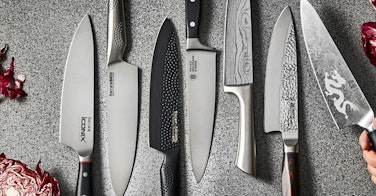Chef's Knives


Discover Baccarat’s extensive range of chef's knives engineered for everyday use with a focus on superior craftsmanship, precision, durability, and sharpness. As one of the most versatile knives in a …
What is a Chef's Knife?
A chef's knife, also known as a cook's knife, is one of the most versatile, all-purpose knives. From precision slicing of meat, dicing tomatoes, barrel peeling potatoes, or carving a roast, the chef's knife can do it all. What makes a chef's knife so versatile is the broad shape of the blade with a curved tip to allow a natural rocking motion when cutting onto a chopping board.
Baccarat’s chef's knives range between 15-20cm; there is a knife for every comfort level and for every task. The most common and versatile size is 20cm and is found in most knife block sets.
Baccarat is proud of its commitment to durability with the use of the highest quality materials, ice hardened, and twice sharpened for superior blade strength. The chef's knife you add to your collection will guarantee outstanding, professional culinary results. Baccarat knives are tested to meet Rockwell hardness specifications, resulting in Japanese steel knives Rockwell 53 and German steel knives Rockwell 55. The industry standard is between Rockwell 52-55.
Each knife is heavily considered with specific balance and ergonomic features such as the weight of the handle, the curve and grip of the handle, and whether the knife is full tang or a triple riveted handle. Some of these features include the finest materials to equally match the blade quality, including Pakkawood, MicroDot™ technology, and polymer. With all these features thoughtfully designed, each knife offers a comfortable grip, perfect balance, and safe handling when in use.
Explore Baccarat’s extensive range of chef's knives today with in-house brands such as Damashiro Emperor (known for its Japanese heritage and Damascus inspired blades), iD3 (seamless full tang design with MicroDot™ handles), Wolfgang Starke (popular German steel collection), and Le Connoisseur (harmonious blend of durable European steel and rustic charm design).
Want to learn more about kitchen knives? Read Baccarat’s article “...Guide to Kitchen Knives.”
Japanese Steel vs. German Steel: Which Baccarat Chef Knife is Right for You?
German steel knives are made with exceptional craftsmanship, durability, and versatility. Ideally, German Steel knives excel at slicing, trimming, portioning & cutting. German steel knives tend to be thicker, allowing for easy cutting of thick meat and dense vegetables, and require less sharpening, perfect for everyday durability. Japanese steel knives are a popular choice for knives due to their exceptional sharpness, durability, rust resistance, unique properties, lightweight, and aesthetics. Japanese steel knives are engineered for precision cutting with thinner steel, allowing finer cuts of food, however require frequent sharpening.
What are the key differences between Japanese steel and German steel?
Japanese Steel Highlights
- Quality Japanese Stainless Steel - 420J2
- 53hrc - steel hardness level (softer)
- Ice hardened
- Twice Sharpened
- Blade angle 15-20 degrees
- Forged steel
German Steel Highlights
- Premium Quality German Stainless Steel - 1.4116
- 55hrc - steel hardness level (harder)
- Ice hardened
- Twice Sharpened
- Blade angle 15-20 degrees
- Forged steel
Popular brands for Japanese steel knives:
Popular brands for German steel knives:
Want to learn more? Read Baccarat’s article “Japanese steel vs German steel - What’s the Difference?”
Care & Maintenance for Your Baccarat Chef Knives
Baccarat chefs' knives are engineered for performance, which requires the highest quality materials such as Japanese steel or German steel. While these materials are dishwasher safe, for long-lasting results, we recommend hand washing your knives with care straight after use, and drying with a dry soft cloth. This will prevent any chips, oxidisation from acidic foods, or rusting from air drying.
Baccarat understands the importance of storing knives in a safe and clean environment, which is why they offer chef knives readily available in knife blocks with a selection of complementary knives, knife block storage units, and magnetic knife mounts.
To maintain a knife’s sharpness, safety during use, and longevity Baccarat has a variety of knife sharpeners, from sharpening steels to whetstones and electric knife sharpeners. As a general rule it is recommended to only sharpen a knife dependent on usage. A guideline for home use would be to sharpen your knives every few months or if you notice any wear and tear such as dullness or nicks in the steel.
A chef's knife is more than just a tool, it's an extension of your culinary passion and can be the centrepiece of the kitchen. With humble beginnings, Baccarat’s goal began with the need for quality, safe cookware for all and gradually grew to include knives, gadgets, and textiles that have gone on to be loved by professional chefs and home cooks alike. For over 35 years, Baccarat has cemented itself as a pioneer in the homewares industry and earned the title of the #1 brand in Australia.
With free shipping on orders over $130 all year round (excluding bulky items), and multiple payment options including Visa, MasterCard, AMEX, PayPal, AfterPay, and Zip Pay, it's no wonder Baccarat is the leading retailer for cookware, knives, and appliances. For more information about terms and conditions, visit Payments Policy and Delivery Information.
Explore Baccarat’s extensive selection of Chef's Knives and knife blocks online today for the best offers available. To stay informed about Baccarat® news and ensure you don’t miss out on exclusive Baccarat deals and early access to sales, we encourage you to create an account.
Frequently Asked Questions (FAQ)
What is the best kitchen knife for a home chef?
There is no “best” kitchen knife to have, as knives are engineered with a specific purpose. However, the chef knife and santoku knives are the most versatile knives to have in the kitchen as they offer the right amount of blade width, balance, and comfort to perform multiple everyday tasks.
What are the three knives that chefs should always have?
Preferences may vary due to tasks the chef is performing or the genre of cooking; however, the most essential knives considered for a chef are as follows:
- Chef knife or santoku knife - the most versatile knife to perform multiple everyday tasks.
- Paring knife - for smaller, intricate tasks, and
- Bread knife - the serrated edge allows to make cuts to food with a firm outer and soft interior, such as bread and tomatoes, without crushing them.
All three knives can be commonly found in knife block sets, dining them as essential kitchen knives.
Do you need both a santoku and a chef's knife?
A chef knife and a santoku knife are both equally versatile in performing everyday tasks; however show a few minor differences. A chef's knife has a curved blade to allow the cook to rock the knife on the cutting board for a more precise cut. While a santoku knife typically has a shorter, wider blade with a flat cutting edge, with recesses on the blade to prevent food from sticking to the blade. Chef's knives can be made of both Japanese steel and German steel, however, Santoku knives are predominantly made of Japanese steel.
Japanese Steel or German Steel, what's best?
There is no definitive “best” steel; however, there are significant differences that set them apart, which will define which is most suitable for the user. German steel knives tend to be thicker, allowing for easy cutting of thick meat and dense vegetables, and require less sharpening. Japanese steel knives are a popular choice for knives due to their exceptional sharpness, durability, rust resistance, unique properties, precision cutting, lightweight, and aesthetics. Japanese steel knives tend to be thinner, allowing finer cuts of food, but require frequent sharpening.
Select your store
Please enter your suburb to see availability information and estimated delivery dates.
Select your store
Your Vouchers
Check gift card balance


